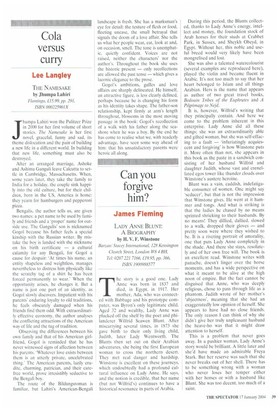Cola versus curry
Lee Langley
THE NAMESAKE
by Jhumpa LAW Flamingo, £15.99, pp. 291, ISBN 000225901X jrhump Lahiri won the Pulitzer Prize in 2000 for her first volume of short stories. The Namesake is her first novel, graceful, funny and sad, its theme dislocation and the pain of building a new life in a different world. In building that new life, something must also be destroyed.
After an arranged marriage, Ashi3ke and Ashima Ganguli leave Calcutta to settle in Cambridge, Massachusetts. When, some years later, they take the family to India for a holiday, the couple sink happily into the old culture, but for their children, born in the US, America is home: they yearn for hamburgers and pepperoni pizza.
Bengalis, the author tells us, are given two names: a pet name to be used by family and friends and a 'proper' name for outside use. The Gangulis' son is nicknamed Gogol because his father feels a special kinship with the Russian writer. By mistake the boy is landed with the nickname on his birth certificate — a cultural calamity for any Bengali, for Gogol a cause for despair: 'At times his name, an entity shapeless and weightless, manages nevertheless to distress him physically like the scratchy tag of a shirt he has been forced permanently to wear.' When the opportunity arises, he changes it. But a name is just one part of an identity, as Gogol slowly discovers. Impatient with his parents' enduring loyalty to old traditions, he feels obscurely damaged when his friends find them odd. With extraordinarily effective economy, the author analyses the conflicting attractions of the American way of life and the tug of tradition.
Observing the differences between his own family and that of his American girlfriend, Gogol is reminded that he has never witnessed signs of affection between his parents. 'Whatever love exists between them is an utterly private, uncelebrated thing.' The American parents, lazily erudite, charming, patrician, and their carefree world, prove irresistibly seductive to the Bengali boy.
The route of the Bildungsroman is familiar, but Lahiri's American-Bengali landscape is fresh. She has a marksman's eye for detail: the texture of flesh or food, fleeting unease, the small betrayal that signals the doom of a love affair. She tells us what her people wear, eat, look at and, on occasion, smell. The tone is unemphatic, quietly confident. Voices are not raised, neither the characters' nor the author's. Throughout the book she uses the historic present — only recollections are allowed the past tense — which gives a laconic elegance to the prose.
Gogol's ambitions, gaffes and love affairs are sharply delineated. He himself, an attractive figure, is less clearly defined, perhaps because he is changing his form as his identity takes shape. The father-son relationship, kept firmly at arm's length throughout, blossoms in the most moving passage in the book: Gogol's recollection of a walk with his father along the seashore when he was a boy. By the end he has come to realise what we, with readerly advantage, have seen some way ahead of him: that his unsatisfactory parents were heroic all along.


































































 Previous page
Previous page